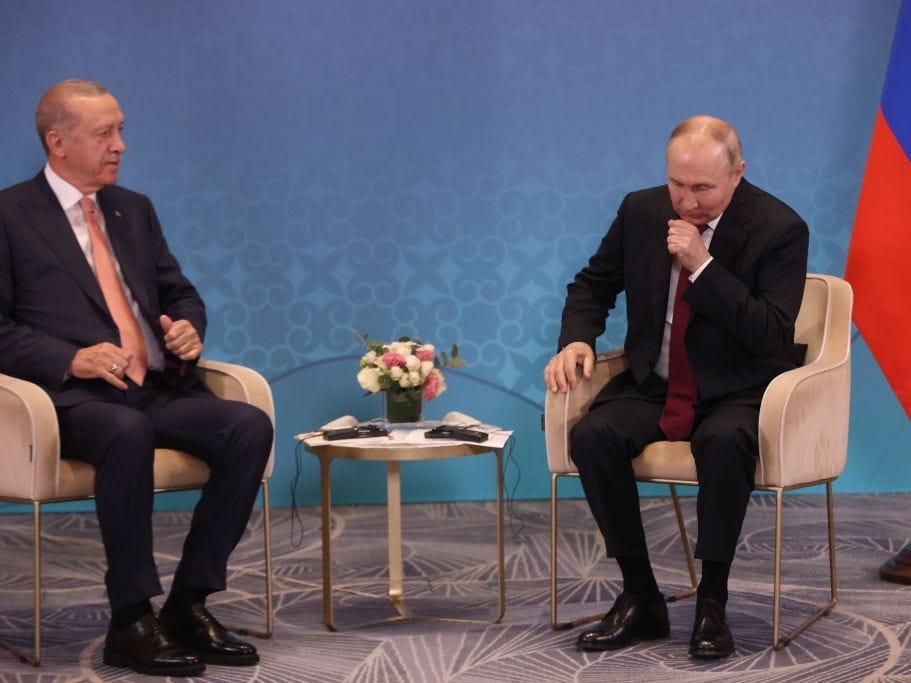-
Erdoğan offered to mediate in the war between Russia and Ukraine, but the Kremlin rejected the proposal.
-
Turkey’s pro-Western leanings and support for Ukraine have strained relations between Erdogan and Putin.
-
Economic problems and defense relations with Ukraine pose a challenge to the Turkey-Russia partnership.
Turkish President Tayyip Erdoğan has long considered being a peace broker in the war between Russia and Ukraine.
Erdoğan recently revived this ambition when he told Russian President Vladimir Putin that Ankara could help end the war, Reuters reported, referring to the Turkish presidency.
The two leaders spoke at the summit of the Shanghai Cooperation Organisation in Kazakhstan, which Putin personally attended.
But Putin does not seem to accept Erdogan’s advances.
Kremlin spokesman Dmitry Peskov told local media It was “impossible” for the Turkish leader to play peacemaker.
Peskov did not elaborate on the reason, but there are new cracks in relations between Turkey and Russia as Erdogan struggles with a years-long economic crisis and a new political landscape at home after his departure. party lost local elections earlier this year.
Putin criticized Turkey for its leaning towards the West
Turkey is a member of NATO, but during the war it balanced relations with Russia, Ukraine and the West, while recognizing Ukraine’s territorial sovereignty.
“One of the biggest annoyances for the Kremlin is Ankara’s position on the war in Ukraine. Although Turkish statements supporting Ukraine’s territorial integrity have never been appreciated by Moscow, they have not provoked any backlash,” Ruslan Suleymanov, wrote a researcher at ADA University in Azerbaijan on Wednesday.
But Erdoğan and Putin also have a personal relationship and both call each other a “dear friend”. Erdogan has even said that he trusts Russia as much as the West.
“But the unique personal cooperation between Putin and Erdogan is rapidly deteriorating,” Suleymanov wrote in his note for the Carnegie Russia Eurasia Center.
Just a month ago, Putin openly criticized Turkey by referring to a partnership between a Turkish defense company and Ukraine.
“I would like to point out that Turkey cooperates with Ukraine in some areas,” Putin said in a statement. meeting with international press agencies. He then claimed that Ukrainian drones attacked gas pipelines supplying Turkey with gas.
He also criticized Ankara’s Western economic orientation, saying: “It seems to me that the Turkish government’s economic bloc has shifted to providing loans, attracting investments and receiving subsidies from Western financial institutions.”
He warned that if “this is linked to restrictions on Turkey’s trade and economic ties with Russia, the Turkish economy will lose more than it can gain.”
In 2022, a Russian state-owned company transferred $20 billion to a subsidiary to build a major nuclear power plant in Turkey, a Turkish official said. Bloomberg it was a gesture of goodwill from Putin for Erdogan’s mediation of a deal to export profits from Ukraine. In 2023, Russia agreed to postpone Turkish payments for $600 million value of natural gas exports.
“The Kremlin clearly expected Erdogan to repay the favor if re-elected. Instead, amid difficult economic conditions at home, the Turkish president has pursued a much more pro-Western course than Moscow expected,” Suleymanov wrote.
Other issues hampering Turkey-Russia relations include: F16 jet deal with US And delay in bilateral trade because of US secondary sanctions.
Turkey too supported Sweden’s bid to join NATO and join a Ukraine Peace Summit in Switzerland last month, which Russia did not participate and called “absurd”.
Ankara and Moscow are still playing nice with each other, but Putin has repeatedly postponed a trip to Turkey originally planned for February, a sign that relations between the two countries are “dramatically deteriorating,” wrote Suleymanov, who expects the rift between the two countries to be serious and long-lasting this time.
Read the original article at Business insider

